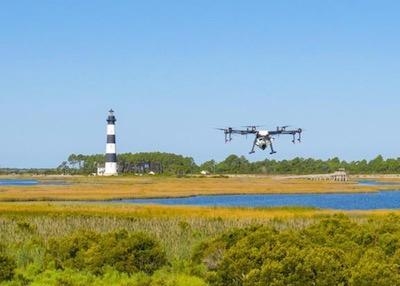Mon, Oct 07, 2019
Combatting Non-Native Species Around Bodie Island Lighthouse
The N.C. Department of Transportation's Division of Aviation and its Environmental Analysis Unit have teamed up to fight invasive plants with a new tool: drones.

The area around Bodie Island Lighthouse was overrun with Phragmites, a type of aggressive, non-native marsh grass that pushes out all native species. NCDOT was responsible for combating the invasive plant as part of its environmental mitigation for the construction of the new Basnight Bridge over Oregon Inlet. The NCDOT Environmental Analysis Unit turned to the Division of Aviation to help explore the use of drones as an alternative to traditional airplane- or helicopter-based herbicide spraying.
The project, which recently wrapped up for the 2019 season, found that drones provide a more targeted and efficient spray operation than traditional methods. Drones use less of the herbicidal spray, as they can be programmed to target a specific area and flown safely at low altitudes to reduce the amount of herbicide blown away by wind. They can also be outfitted with cameras that allow officials to monitor areas without having to step through potentially dangerous terrain or disturbing other plant and animal life.
“The drone has minimal impact on the surrounding area," said Morgan Weatherford, environmental modeling team lead with the NCDOT Environmental Analysis Unit. “It was easier to avoid harming native species, better targeted, and quick to mobilize - great for somewhere with unpredictable weather like on the Outer Banks."
Drones are also safer and more cost effective than manned aircraft for these types of operations because they eliminate the need for plane and helicopter pilots to fly low while applying the herbicide. Additionally, in the case of popular tourist sites like Bodie Island Lighthouse, the area doesn't need to be closed to the public while operations are taking place.
“This was a one-of-a-kind partnership, and the first time a drone had ever been used for herbicide spraying on National Park Service land," added Weatherford. “We plan to continue and expand our drone program in the future."
(Image provided with NCDOT news release)
More News
Cooperative Surveillance Any surveillance system, such as secondary surveillance radar (SSR), wide-area multilateration (WAM), or ADS-B, that is dependent upon the presence of cert>[...]
Aero Linx: OX5 Aviation Pioneers Incorporated in 1955 as a Pa 501 (c)(3) Not for Profit Corporation, the OX5 Aviation Pioneers is dedicated to bringing before the public the accomp>[...]
The Pilot Appeared To Regain Control After Six Rotations And Attempted To “Fly Out” Inverted But Had Insufficient Altitude On November 8, 2025, at 1038 eastern standard>[...]
From 2018 (YouTube Edition): Aero-News Talks With The Airplane's Builder One of the many unique airplanes at AirVenture 2018 was a 1/3-scale B-17 bomber built by Jack Bally, who ta>[...]
Aero Linx: Society of U.S. Army Flight Surgeons (SoUSAFS) The Society of US Army Flight Surgeons (SoUSAFS) serves to advance the science and art of Aerospace Medicine and its allie>[...]
 ANN's Daily Aero-Term (12.04.25): Cooperative Surveillance
ANN's Daily Aero-Term (12.04.25): Cooperative Surveillance ANN's Daily Aero-Linx (12.04.25)
ANN's Daily Aero-Linx (12.04.25) NTSB Prelim: Extra Flugzeugproduktions EA 300/SC
NTSB Prelim: Extra Flugzeugproduktions EA 300/SC Classic Aero-TV: The Bally Bomber - The All Time Ultimate Warbird Replica?
Classic Aero-TV: The Bally Bomber - The All Time Ultimate Warbird Replica? ANN's Daily Aero-Linx (12.05.25)
ANN's Daily Aero-Linx (12.05.25)



